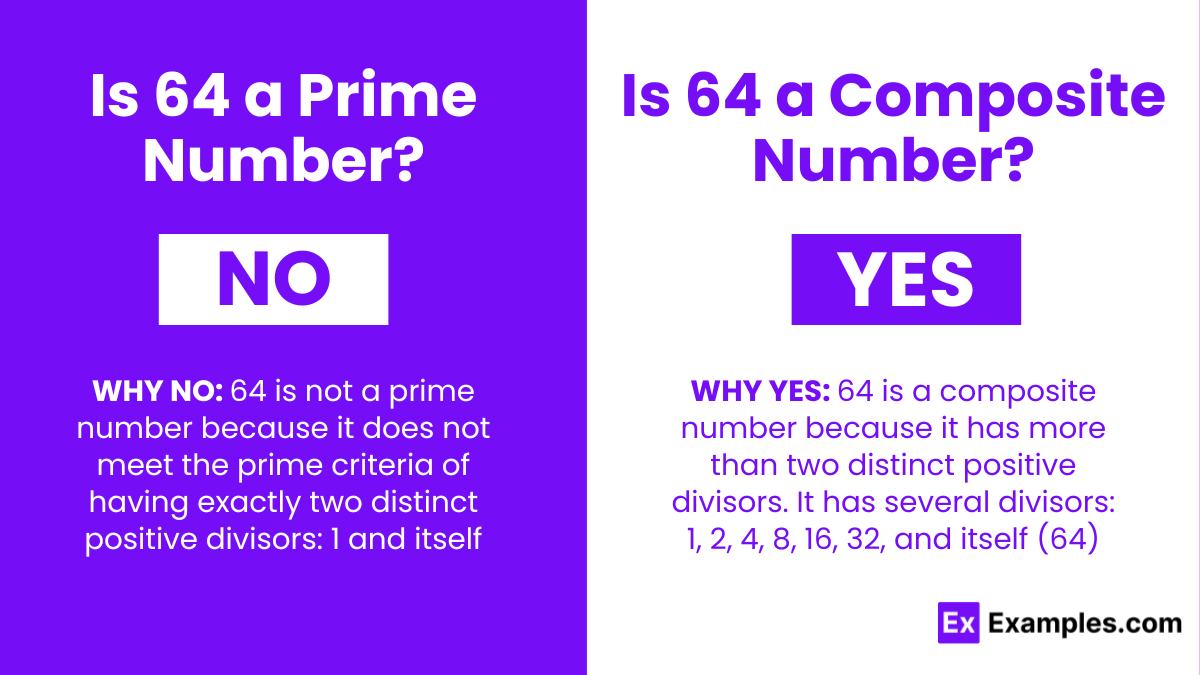Is 64 a prime number?
Yes
No
Maybe
Not enough information


Why No: 64 is not a prime number because it does not meet the prime criteria of having exactly two distinct positive divisors: 1 and itself. Instead, 64 has divisors 1, 2, 4, 8, 16, 32, and 64.Use this prime number tool to see if any number is Prime or not
Why Yes: 64 is a composite number because it has more than two distinct positive divisors. It has several divisors: 1, 2, 4, 8, 16, 32, and itself (64).
| Property | Answer |
|---|---|
| Is 64 a prime number? | No |
| Is 64 a composite number? | Yes |
| Is 64 a perfect square? | Yes |
| Factors of 64 | 1, 2, 4, 8, 16, 32, 64 |
| Multiples of 64 | 64, 128, 192, 256, 320, 384, 448, 512, 576, 640 |
| Cube Root of 64 | 4 (64 is a perfect cube as well) |
| Square of 64 | 4096 |
| Square Root of 64 | 8 |
| Is 64 a Perfect Cube? | Yes |
| Is 64 an Irrational number | No |
| Is 64 a Rational number | Yes |
| Is 64 a Real number | Yes |
| Is 64 an Integer | Yes |
| Is 64 a Natural number | Yes |
| Is 64 a Whole number | Yes |
| Is 64 an Even or odd number | Yes (64 is an even number) |
| Is 64 an Ordinal number | Yes |
| Is 64 a Complex number | Yes (as all real numbers are also complex numbers) |
The factors of 64 include 1, 2, 4, 8, 16, 32, and 64, showcasing its nature as a power of two and highlighting its divisibility by smaller powers of two.
64 is recognized not as a prime number but as a composite number because it has divisors other than 1 and itself, specifically 1, 2, 4, 8, 16, 32, and 64. This distinguishes it from prime numbers, which have exactly two distinct positive divisors. While the number 64 may not be as frequently associated with harmony or spiritual significance in various cultures as some numbers, it serves as a reminder of the diversity and utility of numbers in mathematics. Its status as a composite and even number underscores the variety of numerical properties and their applications in different fields, highlighting the integral role of mathematics in understanding the world around us.
The nearest prime numbers to 64 are 61 (before) and 67 (after). These are the closest prime numbers, highlighting 64’s position surrounded by prime values on the numerical line.
No, 64 is not a prime factor. Prime factors are prime numbers that can multiply together to equal a given number. 64 is a composite number so its prime factor is 2, not 64 itself.
The negative factors of 64 are -1, -2, -4, -8, -16, -32, and -64. These are simply the negatives of the positive factors, since both positive and negative numbers can be divisors.
The sum of all factors of 64, including 1, 2, 4, 8, 16, 32, and itself (64), when added together, equals 127, demonstrating the totality of its divisors.
Text prompt
Add Tone
10 Examples of Public speaking
20 Examples of Gas lighting
Is 64 a prime number?
Yes
No
Maybe
Not enough information
What is the smallest prime factor of 64?
2
3
5
7
What is the sum of the prime factors of 64?
6
8
10
12
If you subtract 8 from 64, what is the result?
56
60
50
52
Which of the following is true about 64?
It is an even number.
It is a prime number.
It has exactly two distinct positive divisors.
It is a prime number and even.
What happens if you double 64?
You get a prime number.
You get a composite number.
You get the same number.
You get a number less than 64.
Which of the following is a prime number less than 64?
60
61
63
64
Which number is greater than 64 and a prime number?
67
66
70
68
Which of these numbers is not a factor of 64?
2
4
6
8
Which number is not a factor of 64?
16
48
32
8
Before you leave, take our quick quiz to enhance your learning!

